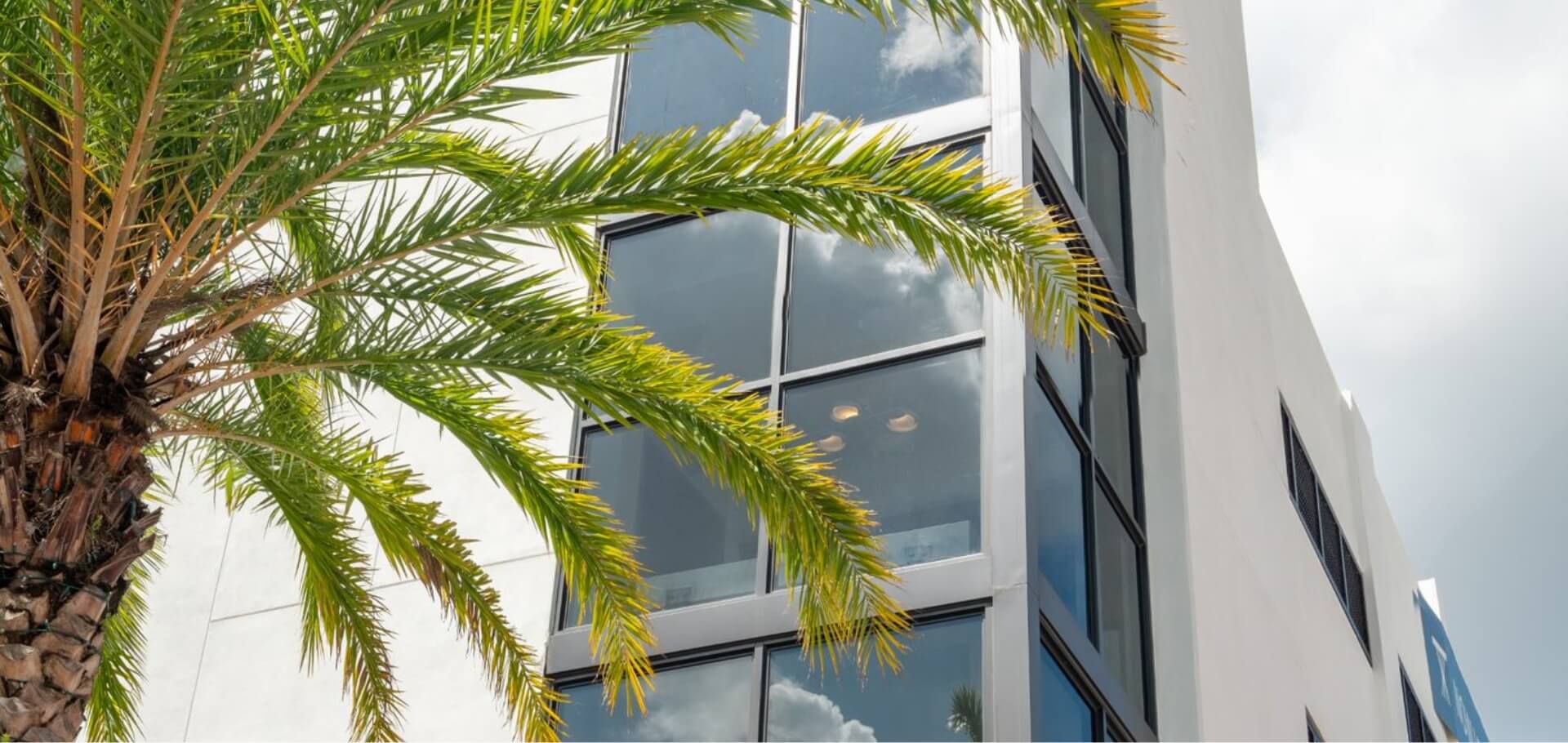The National Oceanic and Atmospheric Administration has predicted that up to 17 named storms (winds of 39 mph or higher) will strike during this year’s hurricane season.
While living in the Sunshine State has many upsides, it also means you’ll almost certainly find yourself in the path of a hurricane or other extreme weather event between June 1 and November 30. In fact, Florida not only ranks first among states for hurricanes, but also ranks first in damages. In 2022 alone, it racked up $116 billion in damages—its most expensive year on record yet.
The best way to weather the weather? Take proactive measures to improve your property’s ability to withstand the season’s unpredictable and destructive weather conditions.
Read on for a roundup of six essential tips for protecting your home (and its inhabitants) during hurricane season.
1. Install Hurricane Impact Windows and Doors
During hurricane-strength winds, your home’s windows and doors are its most vulnerable openings. When a storm is in your weather forecast, do you really want to be worrying about your home’s doors blowing off and your windows shattering into glass shard projectiles?
Upgrading to high-quality impact resistant hurricane windows and doors is at the top of the list of things you can do to safeguard your home during a storm. Constructed to endure high winds and debris impact with impact-resistant glass and durable frames, these specially designed windows and doors provide an excellent barrier against the elements.
In addition to reducing the risk of breakage, hurricane doors and windows also fortify the structural integrity of your home. The best part? This home hardening measure can be taken at any time.
And don’t forget your garage doors! Also extremely susceptible to hurricane-force winds, you can strengthen your garage door by installing a vertical garage door brace kit, reinforcing it with impact-resistant materials, or investing in a new, hurricane-rated door engineered specifically for strength and durability. These measures can prevent the door from collapsing under extreme pressure.
2. Prepare for Potential Flooding
Flooding is a major concern during hurricanes. There are several things you can do to minimize the risk of water damage, including the following precautions:
- Clear Gutters. Clogged gutters can lead to overflow, causing water to seep (or flow) into your home’s foundation. Facilitate proper water flow by making sure gutters and downspouts are clear of debris.
- Stock Up on Sandbags. Keep sandbags or flood barriers at the ready to use as barriers to divert water from vulnerable areas of your home, such as doors and low-lying windows.
- Check the Drainage System. If rainwater flows toward your home instead of away from it, interior flooding is just a matter of time. Regrading your yard will create a proper slope to direct drainage away from the foundation.
3. Upgrade Your Roof with Retrofitting Options
Alongside impact windows and impact doors, the roof is also a critical component of your home’s hurricane defense system. You can strengthen its integrity with the following retrofitting options:
- Roof Straps. Also known as hurricane straps or tie-downs, roof straps secure the roof to the walls of your home preventing it from lifting or being torn off during high winds.
- Reinforced Gable Ends. Reinforce susceptible gable ends with braces or sheathing to increase their strength and wind resistance.
- Routine Inspections and Repairs: Schedule regular roof inspections to identify any loose or damaged shingles or other concerns, and promptly attend to repairs to ensure that it’s in good condition before hurricane season arrives.
4. Trim and Secure Trees and Landscaping
Downed branches and trees are a major cause of damage during hurricanes, while furniture and other objects in your yard can turn into projectiles in high winds.
Evaluate your landscaping and take any necessary preventative measures, including:
- Trim branches that are close to your home and removing any dead or weak trees
- Secure or store outdoor furniture, potted plants, and other items to prevent them from causing damage to your home or surrounding structures
5. Create an Emergency Preparedness Kit
During a storm, you may find yourself hunkering down for extended periods of time—potentially without water or power.
Your hurricane preparedness plan should include an at-the-ready emergency kit that includes essential supplies, such as
- Non-perishable food
- Drinking water
- Flashlights
- Batteries and chargers
- First aid items
- Medications
- Battery-powered radio
This kit should be easily accessible, and all family members should know its location. This is also an opportunity to devise a family emergency plan comprising communication methods, evacuation routes, and a designated meeting point.
Finally, commit to regularly inventorying the contents of your emergency preparedness kit and reviewing your family emergency plan to ensure that both are accurate and up to date.
6. Review and Update Insurance Coverage
Despite your best efforts, some hurricane damage is unavoidable. In this case, adequate insurance coverage can make all the difference.
Prior to the start of hurricane season, take a few minutes to review your homeowner’s insurance policy to understand your policy. Pay careful attention to coverage for wind and flood damage, and consider adding optional coverage for related things like additional living expenses, external structures, or replacement cost coverage.
Be sure to keep your policy and insurance company contact information in a secure location so it’s readily available if and when you need it. (Remember, you may not have power so may be unable to access your account online.)Protecting your home during hurricane season requires proactive planning and preparation—especially in Florida, the country’s most hurricane-prone state. Because while you can’t prevent hurricanes and other extreme weather events, you can improve your home’s ability to withstand them. Taking these six steps will not only enhance the safety and resilience of your home, but will also offer priceless peace of mind when a storm is bearing down on you.
